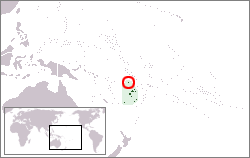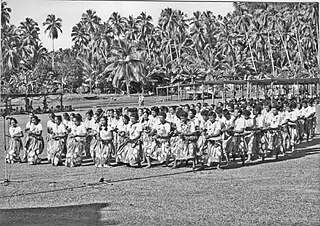Related Research Articles

Rotuma is a Fijian dependency, consisting of Rotuma Island and nearby islets. The island group is home to a large and unique Polynesian indigenous ethnic group which constitutes a recognisable minority within the population of Fiji, known as "Rotumans". Its population at the 2017 census was 1,594, although many more Rotumans live on mainland Fijian islands, totaling 10,000.
Polynesians form an ethnolinguistic group of closely related people who are native to Polynesia, an expansive region of Oceania in the Pacific Ocean. They trace their early prehistoric origins to Island Southeast Asia and form part of the larger Austronesian ethnolinguistic group with an Urheimat in Taiwan. They speak the Polynesian languages, a branch of the Oceanic subfamily of the Austronesian language family.

Since becoming independent of the United Kingdom in 1970, Fiji has had four constitutions, and the voting system has changed accordingly.
Fijians are a nation and ethnic group native to Fiji, who speak Fijian and share a common history and culture.

Samoans or Samoan people are the indigenous Polynesian people of the Samoan Islands, an archipelago in Polynesia, who speak the Samoan language. The group's home islands are politically and geographically divided between the Independent State of Samoa and American Samoa, an unincorporated territory of the United States of America. Though divided by national border, the culture and language are the same.
Rotuman, also referred to as Rotunan, Rutuman or Fäeag Rotuạm, is an Austronesian language spoken by the indigenous people of the South Pacific island group of Rotuma, an island with a Polynesian-influenced culture that was incorporated as a dependency into the Colony of Fiji in 1881. Classification of Rotuman is difficult because of the large number of loan words from Samoan and Tongan, as a result of much cultural exchange over the history of the Pacific. Linguist Andrew Pawley groups the language with the West Fijian languages in a West Fijian–Rotuman branch of the Central Pacific subgroup of Oceanic languages.

Dance in Rotuma refers to the traditional and modern dance styles performed by the people of the island of Rotuma, which became a dependency of Fiji in 1881. Despite Rotuma's political and historical links with Fiji, the island's culture shows strong Polynesian influences, particularly from Samoa and Tonga, which, along with Fiji, feature strongly in the history and traditions of the Rotuman people.
Mak Sa'moa is an informal Rotuman dance form derived from Samoan movement styles, including the style of hand movements between man and woman, and the shuffling/twisting of the feet in and out, as in the Siva Samoa.

Meke, in the Fijian language, is all traditional style of dance. It is a cognate of the words "maka" (Rotuman) and "mele" in Hawaiian. It is typically performed during celebrations and festivals. Traditionally the dances that comprise the meke art form are performed by groups of men only or women only, however, foreign influences, such as the male/female Tongan ma'ulu'ulu becoming the Fijian vakamalolo, are evident throughout.
Colonel Paul Manueli was a former Commander of the Royal Fiji Military Forces, a former Fiji Cabinet minister, Senator and successful businessman.
The Rotumans are a Polynesian ethnic group native to Rotuma, an island group forming part of Fiji. The island itself is a cultural melting pot at the crossroads of the Micronesian, Melanesian and Polynesian divisions of the Pacific Ocean, and due to the seafaring nature of traditional Pacific cultures, the indigenous Rotuman have adopted or share many aspects of its multifaceted culture with its Melanesian, Micronesian and Polynesian neighbours.
Fiji has three official languages under the 1997 constitution : English, Fijian and Fiji Hindi. The Fijian language is spoken as the first language by most indigenous Fijians who make up around 54% of the population.
Vilsoni Hereniko is a Rotuman playwright, film director and academic. He was the writer and director of Rotuma's first ever feature film, The Land Has Eyes.
Yuki Kihara is an interdisciplinary artist of Japanese and Samoan descent. In 2008, her work was the subject of a solo exhibition at the Metropolitan Museum of Art in New York; it was the first time a New Zealander and the first time a Pacific Islander had a solo show at the institution. Titled Shigeyuki Kihara: Living Photographs, the exhibition opened from 7 October 2008 to 1 February 2009. Kihara's self-portrait photographs in the exhibitions included nudes in poses that portrayed colonial images of Polynesian people as sexual objects. Her exhibition was followed by an acquisition of Kihara's work for the museum's collection.
Viking Records was an independent record label that featured many New Zealand and Polynesian recording artists.
Daniel Rae Costello was a Fijian-born musician based in Samoa. He died on 22 July 2019 of cancer.

Severe Tropical Cyclone Tino was a tropical cyclone which itself and an associated convergence zone caused significant damage across ten island nations in the South Pacific Ocean during January 2020. First noted as a tropical disturbance during January 11, to the southwest of Honiara in the Solomon Islands, the system gradually developed over the next few days as it moved eastwards in between the Solomon Islands and Vanuatu prior to being named Tino as it approached Fiji during January 16. Continuing to track south-eastward, Tino continued strengthening as it passed near Fiji, bringing copious amounts of rainfall to the area. Whilst losing latitude, the system continued to strengthen and peaked as a category 3 tropical cyclone on January 17, with signs of an eye forming. Shortly after peak intensity, Tino was impacted by high wind shear and decreasing sea surface temperatures, triggering a weakening trend. Tino moved out of the tropics shortly thereafter and became an extratropical cyclone during January 19.
Tupe Lualua is a New Zealand-Samoan choreographer, director and founder of the dance company Le Moana, and producer of the Measina Festival. In 2019 she was the Creative New Zealand Samoa Artist in Residence.

Amanaki Lelei Prescott-Faletau is an actor, writer, dancer, choreographer, producer and director of Tongan descent, living in New Zealand. As a playwright, she became the first fakaleitī to have her work published in New Zealand with Inky Pinky Ponky. This play was awarded Best Teenage Script (2015) by New Zealand Playmarket. As an actor, she was awarded best performance at the 2015 Auckland Fringe Festival for Victor Rodger's Girl on the Corner. Her acting credits include The Breaker Upperers (2018), SIS (2020), The Panthers (2021), The Pact (2021) and Sui Generis (2022), in which she is also a writer for the TV series. Faletau competed as a dancer in the World Hip Hop Dance Championships in 2011 and has been a judge at the National Hip Hop Championships in New Zealand over several years.
Rotuman New Zealanders are Rotuman immigrants in New Zealand, typically from Rotuma Island or Fiji, their descendants, and New Zealanders of Rotuman ethnic descent. At the time of the 2018 New Zealand census, 981 people in New Zealand were surveyed as being of Rotuman descent.
References
- 1 2 "Letila Mitchell". www.rotuma.net. Retrieved 2018-07-24.
- ↑ "Tuwawa Profile: MEET LETILA MITCHELL, DIRECTOR OF FIJI ARTS COUNCIL". Tuwawa Profile. 2008-07-09. Retrieved 2018-07-24.
- ↑ "WCC Creative Skills workshops come to the Pacific - Visiting Arts". Visiting Arts. 2016-04-05. Retrieved 2018-07-24.
- ↑ "Rotuma group looks to build connections through NZ". Radio New Zealand. 2018-06-22. Retrieved 2018-07-24.
- ↑ "CLOAKS OF PROTECTION - A Pacific Dance of Experienced Feeling". www.theatreview.org.nz. Retrieved 2018-07-24.
- ↑ Release, Press (2018-06-25). "Rotuman Dance Company Debut In Aotearoa - Samoa Planet". Samoa Planet. Retrieved 2018-07-24.